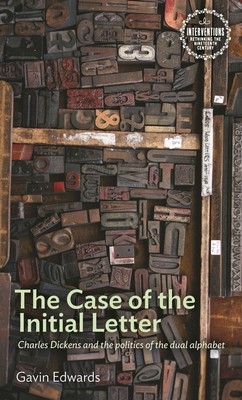
- Mēs nosūtīsim 10-14 darba dienu laikā.
- Autors: Gavin Edwards
- Izdevējs Manchester University Press
- Gads: 2020
- Lapas: 184
- ISBN-10 : 1526146290
- ISBN-13 : 9781526146298
- Formāts: 14 x 21.6 x 1.3 cm, kieti viršeliai
- Valoda: Anglų
- Extra -10% atlaide, ievadot kodu: EXTRA
Atsauksmes
Apraksts
This book analyses attempts by Dickens and other nineteenth-century writers to challenge the established ways of distinguishing between upper and lower case letters in the interests of wider radicalism.
Hazlitt's claim that in the wake of the French revolution, 'capital letters are no more allowed in print than letters patent of nobility are allowed in real life ... Everything must be reduced to an absolute level' simplifies an important truth: the dual alphabet works metaphorically on the basis of visual appearance. Elevated letters are for elevated things.
This work makes links between Dickens and Marx, whose translator - Manchester lawyer Samuel Moore - adapted Das Kapital (1867) to English conventions of capitalisation in Capital (1987). Millicent Garrett Fawcett referred to 'Woman' and 'Man' rather than 'women and 'men' as a reaction to Dickens's satires on the talk of activist women and influenced the proto-modernist innovations of fellow suffragist Augusta Webster, who removed the initial capital from the verse line in Portraits (1870).
Decisions about capitalisation have traditionally been made by publishers rather than writers. Dickens's manuscripts, corrected proofs and 'prompt copies' for public Readings reveal his growing awareness of the social relations of literary production and reception and of the dual alphabet as largely inaudible. Partly in consequence, his later novels recast class in terms of peoples' access to different forms of language.
This exploration of unconventional capitals will find its home with students and lecturers in the literary and cultural history of the English-speaking world as well as students of Dickens, Marx and suffragist feminism.
10 EXTRA % atlaide
Kupona kods: EXTRA
Akcija beidzas 7d.06:55:58
Atlaides kods derīgs pirkumiem no 10 €. Atlaides nav kumulatīvas.
Derīgs tikai pirkumiem tiešsaistē.

- Autors: Gavin Edwards
- Izdevējs Manchester University Press
- Gads: 2020
- Lapas: 184
- ISBN-10: 1526146290
- ISBN-13: 9781526146298
- Formāts 14 x 21.6 x 1.3 cm, kieti viršeliai
- Valoda: Anglų
This book analyses attempts by Dickens and other nineteenth-century writers to challenge the established ways of distinguishing between upper and lower case letters in the interests of wider radicalism.
Hazlitt's claim that in the wake of the French revolution, 'capital letters are no more allowed in print than letters patent of nobility are allowed in real life ... Everything must be reduced to an absolute level' simplifies an important truth: the dual alphabet works metaphorically on the basis of visual appearance. Elevated letters are for elevated things.
This work makes links between Dickens and Marx, whose translator - Manchester lawyer Samuel Moore - adapted Das Kapital (1867) to English conventions of capitalisation in Capital (1987). Millicent Garrett Fawcett referred to 'Woman' and 'Man' rather than 'women and 'men' as a reaction to Dickens's satires on the talk of activist women and influenced the proto-modernist innovations of fellow suffragist Augusta Webster, who removed the initial capital from the verse line in Portraits (1870).
Decisions about capitalisation have traditionally been made by publishers rather than writers. Dickens's manuscripts, corrected proofs and 'prompt copies' for public Readings reveal his growing awareness of the social relations of literary production and reception and of the dual alphabet as largely inaudible. Partly in consequence, his later novels recast class in terms of peoples' access to different forms of language.
This exploration of unconventional capitals will find its home with students and lecturers in the literary and cultural history of the English-speaking world as well as students of Dickens, Marx and suffragist feminism.

Atsauksmes